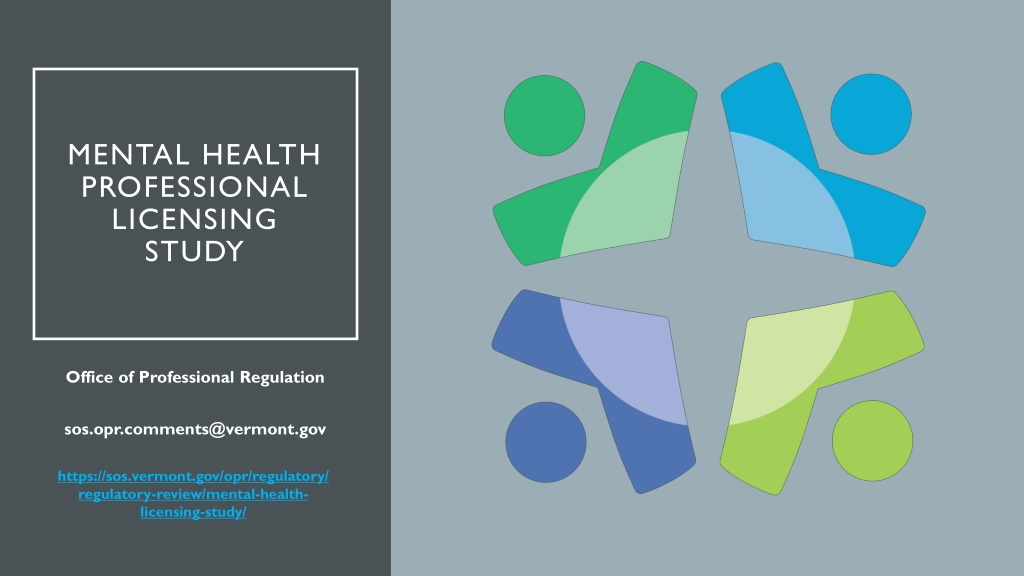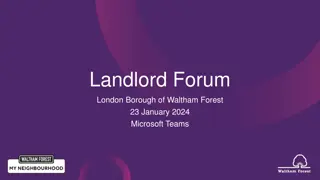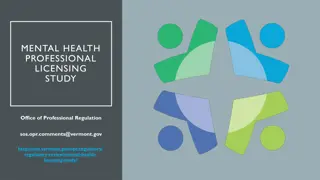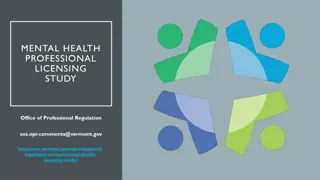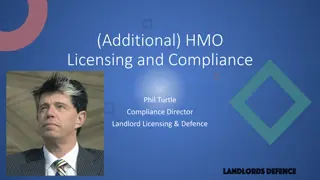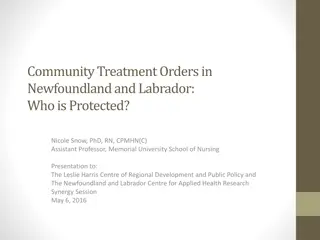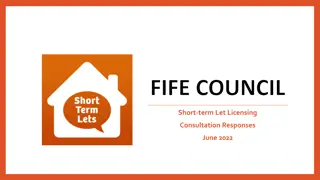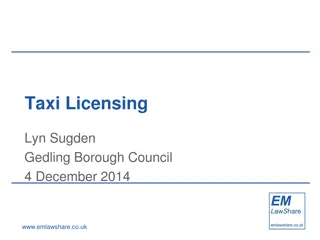Mental Health Professional Licensing Study Overview
Detailed information about the Mental Health Professional Licensing Study conducted by the Office of Professional Regulation in Vermont. The study aims to explore streamlining licensure processes, addressing barriers for marginalized groups, and assessing the need for additional regulation for supervisors. Key highlights include kickoff meeting notes, study goals, outreach strategies, and important dates.
Download Presentation

Please find below an Image/Link to download the presentation.
The content on the website is provided AS IS for your information and personal use only. It may not be sold, licensed, or shared on other websites without obtaining consent from the author.If you encounter any issues during the download, it is possible that the publisher has removed the file from their server.
You are allowed to download the files provided on this website for personal or commercial use, subject to the condition that they are used lawfully. All files are the property of their respective owners.
The content on the website is provided AS IS for your information and personal use only. It may not be sold, licensed, or shared on other websites without obtaining consent from the author.
E N D
Presentation Transcript
MENTAL HEALTH PROFESSIONAL LICENSING STUDY Office of Professional Regulation sos.opr.comments@vermont.gov https://sos.vermont.gov/opr/regulatory/ regulatory-review/mental-health- licensing-study/
AGENDA Act 117 Review Kickoff Meeting Review Study Goals Discussion
The Office of Professional Regulation shall conduct a study on: 1. The possibility of streamlining the licensure of mental health professionals Review requirements and processes for mental health licensure 2. Whether additional regulation of supervisors for professionals-in-training is necessary ACT 117 of 2022 3. The barriers to entry into mental health professions for marginalized groups Available here: Section 8 (page 8) OPR shall submit findings and recommendations on or before December 15, 2024.
SEPT. 30TH KICKOFF MEETING NOTES Licensing Study introductory meeting September 30th Major Feedback 1. OPR needs to perform more outreach beyond email invitations In response OPR conducted phoned over 40 individuals/organizations October 4th sub-meeting on outreach strategies and contacts Additional outreach is still ongoing we welcome more suggestions! 2. A discussion on study questions, goals, and scope must precede study design
Questions and Goals and Scope Research, Resources, and Learning Report Recommendations
10/16 MEETING GOAL: IDENTIFY ISSUES TO BE ADDRESSED BY SUBCOMMITTEES Barriers Streamlining Supervision
Barriers to Entry Streamlining Supervision Exam accommodations; alt. pathways Qualification supplementation criteria; transitioning between professions Compacts; endorsements/reciprocity Provisional licenses Workforce development Credential requirements accessibility/FAQ Applications/records requests Website/rules accessibility; document links; CE requirements; multiple license types; equity; barriers MOU s Roster use; multiple boards; insurance; roster v. credential tiers; Additional disciplines: art/music therapy; school counseling; Collaborative board/multi profession board/VT Mental Health Board Clinician continuity of care/compensation (post licensure, pre paneling) OPR example disclosure documents Telehealth/compact integration; disclosure rules; Overlapping (multi profession) rules accessibility Client file recipient rules Cross-profession supervision req s PSYA supervised practice Barriers to supervision; accommodations Payment structures Contracts Other jurisdictions (states) Private practice v. agency settings Supervision hourly rules criteria Direct v. indirect service criteria
BARRIERS TO ENTRY ACT 117 CONSIDERATIONS Licensing barriers for individuals including: STUDY ISSUES/QUESTIONS E.g., what does equity mean in mental health professional licensing? BIPOC Refugees and new Americans LGBTQ Low income Individuals with disabilities Individuals with lived mental health and substance use experience
STREAMLINING ACT 117 ISSUES STUDY ISSUES/QUESTIONS Possibility of streamlining the licensure, including: Barriers to licensure Feasibility of creating one mental health license
SUPERVISION ACT 117 ISSUES STUDY ISSUES/QUESTIONS Additional supervisor regulations based on: Barriers to supervision Areas of specialization/experience Supervision fees/compensation Supervisee load
EMAIL OPR sos.opr.comments@vermont.gov
